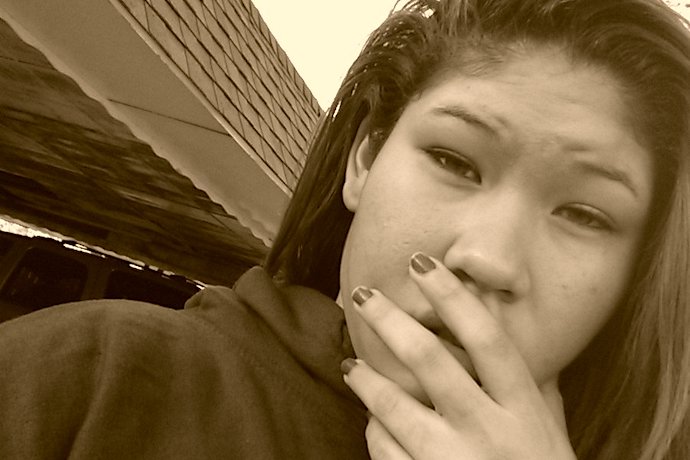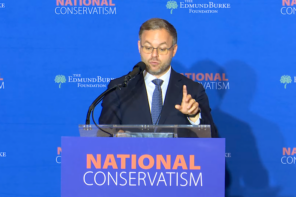In light of new developments in right-wing, heavily evangelical states, it is both laughable and deeply upsetting that certain scholars have recently argued, irresponsibly, that abortion isn’t as significant an issue to white evangelicals as it once was. And, as the case of Brittney Poolaw shows, it isn’t just Texas’s “heartbeat” law and its pernicious influence on other state legislatures that belie such claims.
On October 6, Oklahoma’s Comanche County Court sentenced the 21-year-old Poolaw, a member of the Comanche Nation, to four years in state prison on a first-degree manslaughter conviction for miscarrying her fetus. The prosecution based its case on the fact that the fetus tested positive for methamphetamine, though even its own expert witness wouldn’t go further than to call drug use a “contributing factor.” In fact, the autopsy indicated a likelihood that Poolaw’s miscarriage was caused by a congenital abnormality and placental abruption (the detaching of the placenta from the uterus).
Poolaw’s shocking case has sparked widespread outcry and been covered in major media outlets, as well it should. And as we reflect on this profound injustice, we would do well to notice the broader pattern of white Christian policing of the bodies of Black and Brown women—a pattern that has deep historical roots in the United States but that has been ramping up again in recent years, and that even has international reach.
For help contextualizing the Poolaw case, RD reached out to Michele Goodwin, a Chancellor’s Professor at the University of California-Irvine and founding director of the Center for Biotechnology and Global Health Policy. The author of Policing The Womb: Invisible Women and the Criminalization of Motherhood, Goodwin told RD, “Britney Poolaw’s conviction of manslaughter in having a stillbirth is deeply troubling.”
“Her case is not alone,” she added, citing as an example the Regina McKnight case that began in the late 1990s and resulted in a homicide conviction in 2001. (In 2008, the South Carolina Supreme Court ruled that McKnight had received an unfair trial.)
McKnight was 23 years old at the time of her arrest, in 1998. “Hers was the first case in the United States involving murder charges brought in the aftermath of a stillbirth,” Goodwin says. “She was Black, poor, and had worked as a farmworker. In other words, she was politically invisible.”
There’s also the more recent case of Purvi Patel, an Indian-American from my home state of Indiana. The politically vulnerable women of color who are swept up in such prosecutions tend to be targeted for drug use, making their maltreatment by the police and court system more palatable to white Americans, who, tellingly, do not face the same scrutiny.
With respect to the role that conservative Christianity plays in such harsh policing of BIPOC women, Goodwin observes, “There is a long history of legislatures and religious organizations using… religion as a means of justifying harmful conduct toward women generally and women of color particularly.”
Looking back to the history of slavery in the United States, Goodwin explained, “Religious leaders often visited plantations, and often they were paid. Their message to Black women and men was that God intended their enslavement and that enslaved Black people should be good to their masters.”
Today’s Christian Right, in its zealous pursuit of extremist anti-choice politics, continues this legacy through differential, racially targeted enforcement as a means of putting women of color “in their place.” And, of course, the rise of private Christian schools beginning in the 1960s was largely a response to desegregation, a means for white Christian parents to continue having their children educated in an all-white environment.
Defense of racial segregation was in fact a key factor in the emergence of the modern Christian Right. It was only when overt racism became politically unviable, in the late 1970s (years after Roe v. Wade), that right-wing Christian leaders like Rev. Jerry Falwell, Sr. began fixating on abortion, pursuing the same old white supremacist patriarchy by other means.
As I noted above, there are international aspects of this pattern as well, through which we can see how the Christian Right’s participation in imperialism and colonialism led to the exportation of this politics abroad, not least through missionary activity as an adjunct to the late Cold War-era proxy wars. If you find yourself wondering just how far America’s right-wing, mostly white evangelicals would go down the path of theocracy given free rein, I suggest you take a look at the recent history of El Salvador.
I heard a lot about missionary activity in El Salvador and Honduras in my 1980s evangelical childhood. It seemed like everyone my family knew had some connection to Christian missions in Central America. And those missions bore their toxic fruit. Today, El Salvador has a significant population of mostly charismatic evangelicals that can be counted on to support reactionary politics. The country also has one of the world’s most draconian abortion bans, passed in 1997, and an extremely troubling record of arresting and convicting women who miscarry.
If white evangelicals and their traditionalist Catholic allies get their way, the United States will eventually have a similar ban in place—or at least a patchwork of state-level bans, many of which will be at least as harsh as Texas’s SB8. Anyone who can get pregnant will be at profound risk, not least of dying from botched back-alley abortions. But in terms of enforcement, undoubtedly the harshest punishments will be reserved for women of color.





